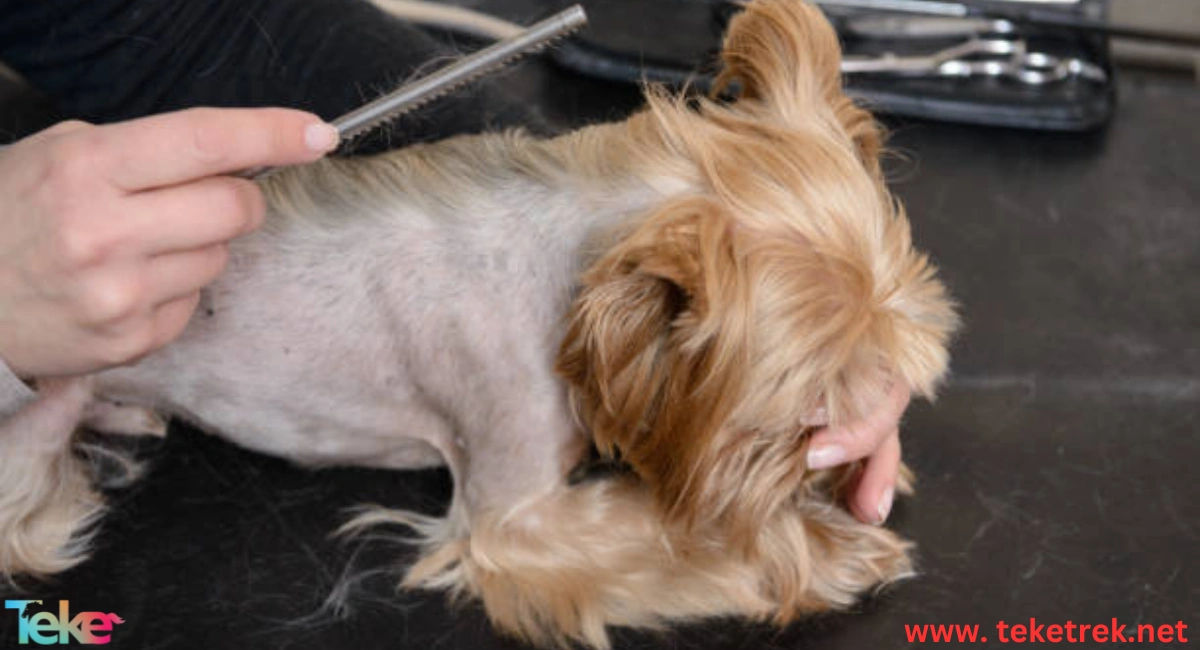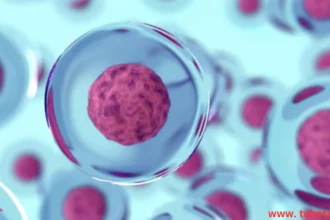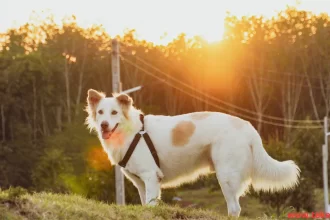Dogs are among the pets that many people prefer to keep. It’s important to understand everything related to dog breeding, identify the diseases that can affect dogs, and know how to treat them. Dog hair loss is common, affecting many animals. Dog hair loss may be normal because hair cells renew themselves daily, unless it’s related to a disease. In this case, the shedding is limited. However, if the shedding is heavy and noticeable, this indicates the presence of a disease in the dog.
There are many causes of hair loss in dogs, including pathological and natural causes. Some dogs may also suffer from alopecia, which leads to noticeable hair loss. There are also certain seasons when dogs shed hair, and therefore each cause has a treatment. Together, we will learn about the causes of hair loss in dogs and ways to treat it. Follow along with us in the following lines from teketrek.
Causes of Hair Loss in Dogs
If you notice that your dog’s hair is constantly falling out, you must find a treatment and solution quickly. To treat hair loss in dogs, you must first identify the cause and then begin treatment. There are many causes of hair loss in dogs, including natural and pathological causes. Here are the causes of hair loss in dogs:
Natural Causes of Hair Loss in Dogs
It is normal for animals, especially dogs, to shed hair. Hair cells are renewed every day, and weak hair falls out and new hair grows in its place. You can determine if the shedding is normal by observing that the amount of hair falling out is small and does not increase every day. Hair falls out when bathing or when the dog grooms itself, and in this case, there is no need to worry.

Pathological Causes of Hair Loss
If you notice that your dog’s hair is falling out in large quantities and frequently, this indicates a disease that must be treated. In cases where hair loss is excessive, here are the most common diseases that cause hair loss in dogs:
Hormonal disorders in dogs that lead to hair loss
Bacterial infections in dogs
Tumors and skin cancer in dogs Intestinal inflammation is a common pathogen that causes hair loss in dogs.
Thyroid disorders
Chemical treatments affect the dog’s hair and lead to hair loss.
Genetic factors contribute significantly to hair loss in dogs.
Inappropriate nutrition, such as unhealthy food that does not contain the appropriate nutritional elements.
A dog’s exposure to certain foods or the environment in which it is raised, can lead to hair loss.
Using an inappropriate shampoo to clean your dog can lead to hair loss.
A dog’s exposure to skin parasites such as fleas and ticks can lead to constant itching, which results in significant hair loss.
Shedding Season
There is a specific season during which dogs shed their hair, known as moulting season, during which the old hair falls out and new hair grows in its place. Shedding season usually occurs in spring and fall for most dogs, including Huskies, German Shepherds, and other breeds. Hair loss is small, while shedding increases significantly in German Shepherds, Border Collies, and Retrievers.
How do you treat hair loss in dogs?
Now that we’ve identified the most important causes of hair loss, here are the most prominent ways to treat it:
Dog hair loss home remedies
Hair loss in dogs can be treated using natural products, such as olive oil, applied to the affected skin in the morning and evening. Apple cider vinegar is also one of the best treatments for hair loss, as it eliminates parasites that cause hair loss. Lemon juice can also be applied by wiping it on the affected areas, as it is a good antibacterial. Coconut oil can also be used, as it is an antifungal and antibacterial.
Hair loss can also be treated by consulting a veterinarian to diagnose the disease and suggest a treatment based on the type of disease your dog is suffering from. There are treatments for allergies and skin lesions.
Vitamins for Dog Hair
There are several vitamins that specialize in reducing hair loss in dogs, especially if the dog has been diagnosed with a nutritional deficiency, which leads to a lack of nutrients for dogs. The type of vitamins varies depending on the dog’s age and breed, so it is recommended to visit a veterinarian to determine the appropriate type of vitamins for your dog.
Ideal Environment and Healthy Food for Aquatic Turtles: Your Guide to Safe and Healthy Rearing
Alopecia in Dogs
Alopecia is a common disease that affects dogs and leads to noticeable hair loss.
Alopecia in dogs symptoms
You can identify alopecia in dogs through these symptoms:
- Scratches on the dog’s skin that vary in severity.
- Red discoloration of the skin, which is thick, inflamed, and smells bad.
- Red spots or pimples on the dog’s skin.
What causes alopecia in dogs?
There are many causes that lead to alopecia in dogs, and it is important to know the causes so that they can be avoided and treated early. Here are the most important causes of alopecia in dogs:
- The presence of parasites on the dog’s skin, such as lice, ticks, mosquitoes, and other parasites.
- Insect stings and spider bites are also causes of alopecia in dogs.
- Skin infections caused by bacteria and fungi.
- Dog allergies to contact and insects.
- Genetic causes.
- Immune system disorders.
- Lack of nutrition and vitamins.
- Unclean environment.
- Psychological conditions such as anxiety, stress, and fear.
How to treat alopecia in dogs?
Alopecia in dogs can be treated by identifying the cause and then finding an appropriate treatment. Treatment can include any of the following:
Treatment with antibiotics, antifungals, and antiparasitic and anti-itch medications.
Topical treatment using sprays, ointments, and medicated shampoos.
In some cases, treatment may require surgical excision.
Use nutritional supplements containing essential fatty acids, vitamins, and minerals.

When should you see a doctor?
Hair loss in dogs is normal, especially during the spring and fall seasons when new hair grows. However, you should consult a veterinarian if the amount and density of hair loss increases, as this indicates a disease in the dog that must be treated.
FAQs
- What vitamin deficiency causes hair loss in dogs
A dog’s body needs many vitamins that aid normal hair growth, such as vitamin E, which stimulates capillaries and promotes hair growth, as well as vitamins A, D, B vitamins, and B6. A deficiency in these vitamins in a dog’s body causes hair loss.
In conclusion, hair loss is a natural occurrence in animals, especially dogs, and occurs continuously throughout the year in limited quantities. However, if the amount exceeds normal, this indicates another cause, whether due to a disease or a genetic cause. In both cases, you should consult a veterinarian for an early diagnosis and to discover the disease causing the dog’s hair loss so that appropriate treatment can be recommended. It is important to note that a clean environment, the use of medicated shampoos, and proper nutrition are essential to overcome the problem of hair loss.





